
AI & Society
metrics 2024
Navigating the Ethical Landscape of Artificial Intelligence
Introduction
AI & Society, published by Springer, is a premier journal that addresses the intricate relationship between artificial intelligence and societal values, offering critical insights into how technology shapes and is shaped by human interactions. With an impressive impact factor and consistently placed in the upper tiers of various categorical rankings, including Q2 rankings in both Artificial Intelligence and Human-Computer Interaction, as well as a Q1 ranking in Philosophy, this journal is essential for scholars looking to explore the ethical, philosophical, and practical dimensions of AI deployment in real-world contexts. Based in the United Kingdom, AI & Society spans from 1987 to 2024 and is widely recognized among researchers in the fields of philosophy, computer science, and social studies. Scholars can access a wealth of thought-provoking articles and reviews, contributing to the ongoing discourse on the implications of AI in contemporary society.
Metrics 2024
 0.98
0.98 2.90
2.90 2.90
2.90 45
45Metrics History
Rank 2024
Scopus
IF (Web Of Science)
JCI (Web Of Science)
Quartile History
Similar Journals
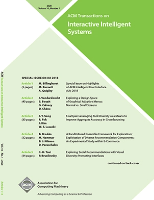
ACM Transactions on Interactive Intelligent Systems
Transforming Ideas into Intelligent Interactions.ACM Transactions on Interactive Intelligent Systems is a distinguished journal published by the Association for Computing Machinery (ACM), specializing in the realms of Artificial Intelligence and Human-Computer Interaction. With an impactful presence in the academic community, it boasts a respectable Q2 quartile ranking in both fields as of 2023, highlighting its significant contributions to advancing interactive intelligent systems. The journal, identified by ISSN 2160-6455 and E-ISSN 2160-6463, encompasses a broad spectrum of research from theoretical advancements to practical implementations, offering invaluable insights for researchers, professionals, and students. The journal not only serves as a platform for innovative ideas and methodologies but also emphasizes the importance of interdisciplinary approaches in its publications. Positioned in the United States, at 1601 Broadway, 10th Floor, NEW YORK, NY 10019-7434, it stands out for its commitment to quality, rigor, and relevance within the computing and interactive systems sectors.

Argument & Computation
Connecting Disciplines: From Argumentation to ApplicationArgument & Computation is an esteemed academic journal dedicated to the interdisciplinary exploration of formal structures of argumentation and their computational applications. Published by IOS PRESS based in the United Kingdom, this Open Access journal, since its inception in 2010 and particularly impactful since 2016, serves as a pivotal platform for researchers and practitioners seeking to advance the fields of Artificial Intelligence, Computational Mathematics, Computer Science Applications, and Linguistics. With its current categorization in Q3 in Artificial Intelligence, Q2 in Computational Mathematics, and Q1 in Linguistics and Language for 2023, the journal maintains a commendable position within the scholarly community, evidenced by its high Scopus rankings, notably in Linguistics and Language where it ranks in the 92nd percentile. By fostering innovative research and discussions, Argument & Computation plays an essential role in bridging theoretical insights with computational practices, making it indispensable for academics, students, and professionals invested in the evolution of argumentation frameworks and their implications in technology and society.

Ethics & Bioethics
Advancing ethical discourse in biology and medicine.Ethics & Bioethics is a vital interdisciplinary journal published by DE GRUYTER POLAND SP Z O O, focusing on the ethical dimensions of biological and medical practices. Since its transition to an Open Access model in 2016, the journal has become more accessible, promoting the dissemination of high-quality research to a broader audience. Based in Warsaw, Poland, this journal contributes significantly to the discourse on ethical practices in health policy, education, and philosophy, as evidenced by its impressive Scopus rankings, including a Q1 quartile in Philosophy. Covering a wide spectrum of ethical issues and dilemmas faced in contemporary society, Ethics & Bioethics provides a platform for researchers, professionals, and students to engage with cutting-edge scholarship aimed at advancing understanding and fostering dialogue in the ever-evolving landscape of bioethics. With a commitment to rigorous peer review and academic integrity, this journal is pivotal for those seeking to enhance their knowledge and contribute to the field.

Human Behavior and Emerging Technologies
Transforming Understanding of Technology's Impact on SocietyHuman Behavior and Emerging Technologies is a pioneering open-access journal published by Wiley-Hindawi, dedicated to advancing the understanding of the intersection between human behavior and technological innovation. With an E-ISSN of 2578-1863, this journal has quickly established itself as a leading platform for disseminating research from 2019 to 2024 and proudly holds a prestigious Q1 ranking in Human-Computer Interaction, Social Psychology, and Social Sciences (miscellaneous) as of 2023. Its exceptional Scopus rankings place it in the top 1% of journals in the fields of general social sciences, social psychology, and human-computer interaction, underlining its significance in an increasingly technology-driven world. The journal aims to foster interdisciplinary collaboration and explore novel approaches to human behavior, offering insights that appeal to researchers, practitioners, and students alike. As an open-access publication, it enhances accessibility to fundamental research findings that inform policy-making, technological development, and social practices in an era characterized by rapid technological advancement.
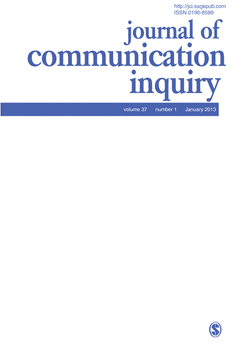
Journal of Communication Inquiry
Advancing Interdisciplinary Dialogue in Communication StudiesJournal of Communication Inquiry, published by SAGE PUBLICATIONS INC, is a premier interdisciplinary journal that serves as a vital platform for scholars and practitioners in the fields of communication, cultural studies, and the arts and humanities. With a rich history dating back to its inception in 1974, the journal has consistently upheld rigorous academic standards, reflected in its impressive rankings within the Q1 and Q2 quartiles across various disciplines according to the latest metrics. The journal's comprehensive scope encompasses theoretical and empirical research, catering to a diverse readership who are keen to explore contemporary communication issues and cultural dynamics. While the impact factor is not explicitly stated, the journal's Scopus ranks position it favorably within its categories, with notable percentiles that highlight its influence in the academic community. As an essential resource for researchers, professionals, and students alike, the Journal of Communication Inquiry invites contributions that advance the discourse surrounding communication practices and cultural phenomena, contributing to the ongoing dialogue in these evolving fields.

Eptic
Fostering Collaboration for a Brighter Scientific Future.Eptic is a prominent open-access journal published by the Universidade Federal de Sergipe, dedicated to advancing the fields of science and technology. Since its inception in 1999, Eptic has provided a platform for researchers, academics, and professionals to disseminate their findings, fostering a collaborative environment that encourages innovation and knowledge sharing within the scientific community. While the journal currently holds an ISSN of 1518-2487 and an E-ISSN of 1518-2487, its commitment to open access ensures that all published articles are freely available to a global audience, empowering students and researchers alike to contribute to and engage with cutting-edge research. The journal's impact within its field, although not quantitatively ranked in HIndex or Scopus, is evident in its dedication to quality and accessibility, making it a vital resource for those seeking to explore new ideas and developments in science and technology.

ENVIRONMENTAL VALUES
Cultivating Critical Conversations on Environmental EthicsENVIRONMENTAL VALUES is a distinguished journal dedicated to exploring the intricate intersections of environmental studies and philosophical discourse. Published by SAGE Publications Inc, this journal has made a significant mark within its fields, featuring a robust impact factor and making it an esteemed Q2 journal in Environmental Science and a prominent Q1 journal in Philosophy as of 2023. With an ISSN of 0963-2719 and an E-ISSN of 1752-7015, ENVIRONMENTAL VALUES provides a scholarly platform for rigorous research, theoretical exploration, and critical dialogue that spans across disciplines, thereby compellingly addressing the ethical dimensions of environmental issues. Its impressive Scopus rankings place it within the top percentile of both the Philosophy and General Environmental Science categories, underlining its relevance and influence. Researchers, professionals, and students are encouraged to engage with the journal to contribute to and learn from cutting-edge discussions that shape our understanding of environmental ethics and values as we move towards 2024 and beyond.
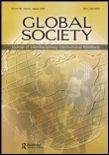
Global Society
Navigating the Complexities of a Changing WorldGlobal Society, published by Routledge Journals, Taylor & Francis Ltd, serves as a vital platform for interdisciplinary research in the fields of Geography, Planning and Development, and Global and Planetary Change. With an ISSN of 1360-0826 and an E-ISSN of 1469-798X, this esteemed journal has maintained a Q2 ranking in Geography, Planning and Development and a Q3 ranking in Global and Planetary Change as of 2023, highlighting its significant contribution to contemporary academic discourse. The journal, operational since 1996 and converging through 2024, aims to foster engagement and dialogue among researchers, professionals, and students on pressing global issues, making it an essential resource for anyone looking to deepen their understanding of societal dynamics and environmental challenges. Although it currently does not offer Open Access options, its robust rank in Scopus underlines its scholarly integrity and relevance in the ever-evolving landscape of global studies.
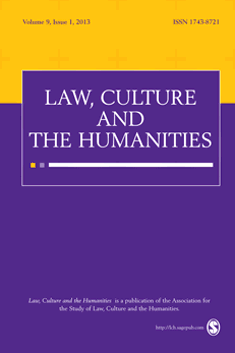
Law Culture and the Humanities
Illuminating the Intersections of Law, Culture, and HumanityLaw Culture and the Humanities, published by SAGE Publications Ltd, serves as a pivotal forum for interdisciplinary dialogue at the intersection of law and the humanities. With an ISSN of 1743-8721 and an E-ISSN of 1743-9752, this esteemed journal has been contributing to scholarly discourse since its inception in 2005 and continues to do so until 2024. The journal carries a respectable impact factor showcased through its category rankings: Q3 in Arts and Humanities (miscellaneous), Q2 in Cultural Studies, and Q3 in Law. Its Scopus rankings reflect an impressive standing in the social sciences, particularly within Cultural Studies and Law, indicating that it is a fundamental resource for researchers and professionals aiming to explore the nuanced relationships between legal frameworks and cultural expressions. While not an Open Access journal, it offers substantial insights into contemporary debates, making it essential for academics and students engaged in the study of law's cultural dimensions.
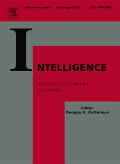
INTELLIGENCE
Pioneering Research in Human IntelligenceINTELLIGENCE, published by Elsevier Science Inc, is a leading international journal dedicated to advancing research in the fields of cognitive psychology, developmental psychology, and human intelligence. With an impact factor reflecting its authority within the academic community, this journal occupies a prestigious position—ranking in the Q1 category for Arts and Humanities and achieving strong Q2 rankings in both Developmental and Educational Psychology and Experimental and Cognitive Psychology. Scholars can access high-quality research articles that contribute to the understanding of intelligent behavior, cognitive processes, and the implications of intelligence in various contexts. By encompassing a broad range of interdisciplinary perspectives since its inception in 1977 and continuing into 2024, INTELLIGENCE serves as an essential resource for researchers, professionals, and students keen to explore the complexities of human thought and learning.